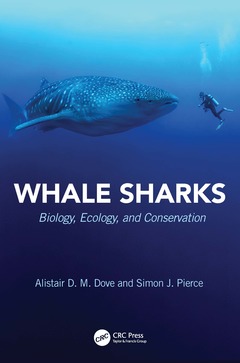Whale Sharks Biology, Ecology, and Conservation CRC Marine Biology Series
Coordonnateurs : Dove Alistair D.M., Pierce Simon J.

Whale sharks are the largest of all fishes, fascinating for comparative studies of all manner of biological fields, including functional anatomy, growth, metabolism, movement ecology, behavior and physiology. These gentle ocean giants have captured the interest of scientists and the imagination of the public, yet their future is uncertain. The conservation status of whale sharks was upgraded to Endangered on the IUCN Red List and the species faces a range of intense threats from human activities. Can these iconic living animals, who have survived for millions of years, survive us?
Written by the world?s leading experts in whale shark biology, ecology, and conservation, Whale Sharks: Biology, Ecology and Conservation is the first definitive volume about the world's biggest fish. Chapters include discussions of satellite-linked tags, used to track whale shark movements; genetic sequencing, to examine evolutionary adaptations; even the use of underwater ultrasound units to investigate the species? reproduction. The editors hope that by collating what is known, they can make it easier for future researchers, conservationists, and resource managers to fill some of the remaining knowledge gaps, and provide the information they need to join the team.
As you work your way through this book, we hope that you will develop a sense of awe and marvel at all of our good fortune to share the ocean, and the planet, with this utterly extraordinary species.
Introduction. 1. How and why is the whale shark the world’s largest fish? 2. Whale shark reproduction, growth, and demography 3. Whale shark sensory biology and neuroanatomy 4. Parasites and other associates of whale sharks 5. Population genetic structure of whale sharks 6. Whale shark movements and migrations 7. Population ecology of whale sharks 8. Whale shark foraging, feeding, and diet 9. Lessons from care of whale sharks in public aquariums 10. Whale shark tourism as an incentive-based conservation approach 11. Global threats to whale sharks 12. Conservation of whale sharks 13. Outstanding questions in whale shark research and conservation.
Alistair D.M. Dove Ph.D. is a broadly trained marine biologist and currently Vice President of Science and Education at Georgia Aquarium in Atlanta, USA, where he oversees international research programs on whale sharks, manta rays, coral reefs, sharks and dolphins. Alistair graduated from the University of Queensland in Brisbane, Australia with a B.Sc. Honours first class in 1995 and a Ph.D. in Microbiology and Parasitology in 1999, for which he was awarded a University Medal and Dean’s List commendation. His early research focus was on parasites and diseases in freshwater and marine environments, but after a period studying diseases of lobsters, he began focusing on the biology and ecology of whale sharks after moving to Georgia Aquarium in 2006.
Simon J. Pierce Ph.D. is a co-founder and Principal Scientist at the Marine Megafauna Foundation, where he leads the global whale shark research and conservation program. Simon is also a Co-Chair for the Sub-Equatorial Africa region within the IUCN Shark Specialist Group, a Science Advisor to the Wildbook for Whale Sharks global database, and a founding board member of the Sawfish Conservation Society. Simon holds a BSc in Ecology from Victoria University of Wellington in New Zealand, and a BSc (Hons, 1st Class) and doctoral degree in marine biology from The University of Queensland in Brisbane, Australia. Simon began working with whale sharks in Mozambique in 2005, and now leads or collaborates on conservation biology and population ecology research programs across the world.
Date de parution : 08-2021
17.8x25.4 cm
Date de parution : 08-2021
17.8x25.4 cm
Thèmes de Whale Sharks :
Mots-clés :
Whale Shark; Elasmobranchs; Nurse Shark; Endangered species; Regional Red List; Planktivores; White Cells; Citizen science; Marine Wildlife Tourism; Marine megafauna; Mitochondrial DNA Analysis; Ocean sustainability; DNA Trace; Whale Shark Tourism; Basking Sharks; Compound Specific Stable Isotope Analysis; Shortfin Mako; Shark Species; Silky Sharks; Fin Whale; Animal Kingdom; Ningaloo Reef; Georgia Aquarium; Aquarium Setting; Oviducal Gland; Mitochondrial Control Region; Cartilaginous Fishes; Filter Pads; IUCN Red List; Band Pairs; Dorsal Fin



